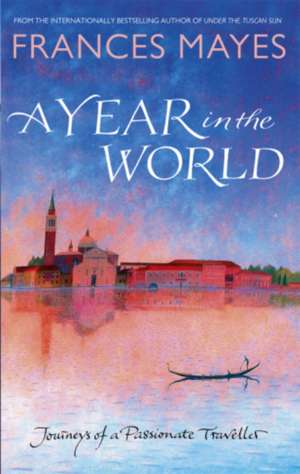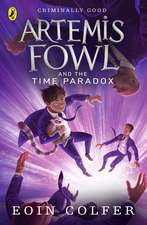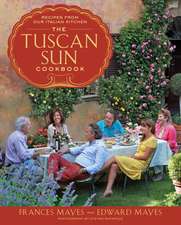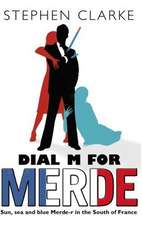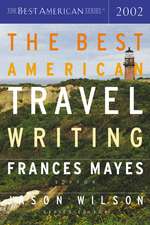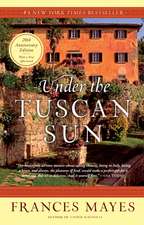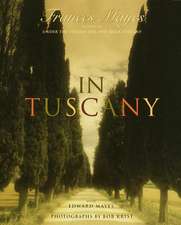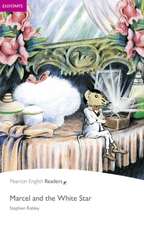A Year In The World
Autor Frances Mayesen Limba Engleză Paperback – 16 iun 2013
| Toate formatele și edițiile | Preț | Express |
|---|---|---|
| Paperback (2) | 107.30 lei 3-5 săpt. | +12.94 lei 6-10 zile |
| Transworld Publishers Ltd – 16 iun 2013 | 107.30 lei 3-5 săpt. | +12.94 lei 6-10 zile |
| BROADWAY BOOKS – 28 feb 2007 | 115.83 lei 3-5 săpt. |
Preț: 107.30 lei
Nou
Puncte Express: 161
Preț estimativ în valută:
20.53€ • 22.37$ • 17.30£
20.53€ • 22.37$ • 17.30£
Carte disponibilă
Livrare economică 02-16 aprilie
Livrare express 18-22 martie pentru 22.93 lei
Preluare comenzi: 021 569.72.76
Specificații
ISBN-13: 9780857502407
ISBN-10: 0857502409
Pagini: 464
Dimensiuni: 199 x 133 x 37 mm
Greutate: 0.31 kg
Editura: Transworld Publishers Ltd
ISBN-10: 0857502409
Pagini: 464
Dimensiuni: 199 x 133 x 37 mm
Greutate: 0.31 kg
Editura: Transworld Publishers Ltd
Notă biografică
Frances Mayesis the author of the now-classicUnder the Tuscan Sun,which was aNew York Timesbestseller for more than two and a half years and became a Touchstone movie starring Diane Lane. Other international bestsellers include:Bella Tuscany,Everyday in Tuscany, A Year in the World,and three illustrated books:In Tuscany,Bringing Tuscany Home,andThe Tuscan Sun Cookbook. She is also the author of two novels,SwanandWomen in Sunlight.She has written six books of poetry andThe Discovery of Poetry.The most recent books areSee You in the PiazzaandAlways Italy.Her books have been translated into more than fifty languages.
Extras
Blood Oranges
Andalucía
Who cut down the moon's
stem?
(Left us roots
Of water.)
How easy to pluck flowers from
This infinite acacia.
--Federico García Lorca
January, old Janus face looking left at the past year and right toward the new. I'm for the new--no mournful backward glance. Make tracks, I write one night on the steamed kitchen window.
The year began with a break-in at my house while my husband and I were finishing dinner. Ed had just tipped the last of a vino nobile into our glasses. Laughing, we were talking about the turn of the year, with Nina Simone crooning "The Twelfth of Never" to us. We'd cleared the plates, the candles were burning down, and outside the dining room window we saw only our potted lemon trees, swaying snapdragons, and yellow Carolina jasmine, for January in California is a blessed season.
In a flash, everything changed. A man crashed through the living room window, screaming that he wanted to die, then loomed on the middle of the rug, his bundled body in ski jacket, droopy pants, and homeboy hat pulled down around his moony face. Even as I write this, my heart starts to pound.
"Give me a knife," he shouted. "I've never done this before, but I'm doing it now." I thought, not does he have a gun will we die, but he's goofy. Then terror pumped through every vein in my body. This can't be happening! Somehow, we'd stood up. Run. My chair tipped over. He lunged into the dining room. I threw my glass of wine in his face, and as he wiped his eyes, we ran out the back door. "I want to die," he shouted to us as we fled into a street darkened by conscientious neighbors in the middle of the latest corruption-engineered energy crisis. Our house was blazing like the Titanic; lights flared in every window. Our intruder had been drawn to us like a fluttering moth toward the screen door on a soft southern night.
Ed grabbed a phone on the way out and somehow called 911 as he sprinted across the street. We ran to separate neighbors, hoping to find someone at home on Saturday night. Startled new Chinese neighbors brought me in and handed me the telephone, though they must have thought I was mad, while the intruder followed Ed across the street to our neighbors Arlene and Dan. Interrupted in the middle of a dinner party, they pulled Ed in and slammed the door. Then our intruder broke through their door--just as the police drove up.
That was the beginning. The drugged young man was on the street again in a month. I found his sunglasses in a flower bed. Expensive. I threw them in the trash. The year rolled on and doesn't bear thinking about. Suffice to say the words surgery, hospitals, deaths. As the sublime September weather arrived, we all experienced the mind-altering, world-shaking attack on America. Go, bad year. May the stars realign.
Now, Janus, my friend, I am going to Spain for a winter month in Andalucía. Andalucía, land of the orange and the olive tree. Land of passionate poets and flamenco dancers and late-night dinners with guitar music in jasmine-scented gardens.
Ed flew to Italy a week ago because, as always, we have some complicated building project in progress. En route to Spain, he has detoured to Bramasole, our house in Cortona, to see about the drilling of a well for a nine-hundred-year-old house we have bought in the mountains. We want to accomplish a historic restoration on this stone house built by hermit monks who followed Saint Francis of Assisi. When I last talked to him, the dowser had felt his stick bend in exactly the spot where I did not want a well and had drilled down a hundred meters without finding a drop. We are planning to meet in Madrid.
From San Francisco, I board a flight to Paris and am happy to see my seatmate take out a book instead of a computer. No white aura and tap-tapping for the ten-hour flight. She looks as if she could have been one of my colleagues at the university. Is she going to Europe to research a fresco cycle or to join an archaeological team at a Roman villa excavation? I take out my own book, ready to escape into silence for the duration. She smiles and asks, "What are you reading?"
"A biography of Federico García Lorca--getting ready for Spain. What are you reading?"
"Oh, a book on John three thirteen."
"Three thirteen. I don't know that verse. We used to sing 'John three sixteen, John three sixteen' in rounds at Methodist Sunday school."
The flight attendant comes by with champagne and orange juice. "Just water," my seatmate and I say in unison. We begin to talk about travel and books, chatting easily, though I am, at first, waiting for a chance to retreat. We know nothing of each other and will part when the scramble to exit at Charles de Gaulle begins.
She asks a lot of questions. I tell her I am a former university teacher, now a full-time writer. I tell her about living part of the year in Italy, and that Italy has given me several books, written with joy. She probes. Are my books published? Are they popular? And if so, do I know why? What do I try to accomplish with my writing? How do I feel about people's responses to my books? On and on. I tell her that I'm embarking on the first of many travels and that I hope to write a book about my experiences. Why? What will I be looking for? I am drawn into lengthy explanations. I say I'm interested in the idea and fact of home. I'm going to places where I have dreamed of living and will try to settle down in each, read the literature, look at the gardens, shop for what's in season, try to feel at home. I'm talking more openly than usual with a stranger. Is she a psychiatrist?
"And you've never felt God's hand on yours?" She looks quizzically at me.
"No. I've felt lucky, though."
"Maybe you are bringing happiness to people through the will of God. Maybe." She smiles.
She answers my own questions evasively. She is holding something back, even in the basic exchanges, such as whether she is on vacation, that simple opening into conversation. Our little equation is out of balance. Finally, I ask bluntly, "What do you do?"
"I . . . I guess you could say I'm a speaker."
"On what subjects?"
Silence. She is gazing out the window. She is a very still person. "I'm part of a foundation. We try to help in communities with severe problems."
Vague. She sees my questioning look. She frowns. "We're involved in education, and orphanages, and churches."
"Oh, so it's a religious foundation? What religion are you?" I assume she is a Presbyterian or Methodist, a good volunteer for good works, or is involved in Catholic charities.
"I know this is strange, but I have a strong sense about you. I'll just tell you my journey." She then describes the surprise of her conversion, her subsequent adoption of six children from all over the world, her work in Africa and Russia. Her husband, a prominent lawyer, eventually had his own revelation and joins her in her missions. Dinner is served and we talk on.
"You've probably never met anyone like me, anyone who hears the voice of God."
"I think I haven't. You hear the voice of God?" Oh, mamma mia, I think.
"Yes, he's talking to me right now, all the time."
"What does he sound like?" I wonder if she is speaking metaphorically, living out a grand as if.
She laughs. "He's funny sometimes. Sometimes we dance. He's telling me about you, but I don't want you to think I'm a psychic with a neon sign in the window!"
I start to ask sarcastically if he is a good dancer and what kind of dances he leads her in--rhumba? But I don't. As a doubter with strong spiritual interests, I'm tantalized by her big holy spirit visitations. I imagine it feels like a mewling kitten being lifted in the jaws of an enormous mother cat and taken to safety. I'm ready myself but have never felt the slightest inkling that anything out there in the void is the least bit interested in the hairs on my head or the feathers of small sparrows. "If God is talking about me, I'd like to hear what he says because I've never heard from him before tonight." Where's the flight attendant? I'd like a big glass of wine. This is getting surreal. I'm thirty-five thousand feet above terra firma with someone who dances with God.
"Well, I will tell you that He says you have the gift of divine humility. How did you get that? It's so rare."
"Maybe it's a lack of confidence!"
"No, I've seen it in one priest, someone I consulted when I felt the urge to prophesy."
Whoa! Prophesy? "Oh, you're a prophet?" I toss this off casually, as though it were Oh, you're from Memphis.
She looks out the window. Sighs. "I know how it sounds. It's so simple." I see her struggling to explain. "I just wait to speak. I wait for God. Sometimes it's just sounds."
"Glossolalia?" She nods. "I've seen that. My friends and I used to peer in the windows at the holy roller and snake-handling churches way down in South Georgia." I don't say that those people fell to the floor writhing and drooling. That we ran away, scared out of our socks. This woman in her Dana Buchman suit and good haircut seems as sane as the United pilot of this plane.
"Have you ever heard of a Charismatic Prophet? That's my calling. I knew I was going to sit beside someone on this flight who would change my life. I always wanted to write. Now I hear how you do it and it frees me to try. God put me beside you. Someone, he says, with a holy approach to writing."
Now I'm really fascinated. Someone who not only hears the voice of God but speaks in the tongues of angels and knows what's coming toward us. And I like hearing God's perception that my approach to writing is holy. No one ever has talked to me about the nature of my involvement with words. I've heard plenty about the words themselves but not about the vocation I have. Turbulence starts to shake the overhead compartments. A queasy flyer, I begin to wonder if maybe she is an angel sent to accompany me to the afterlife when the plane spirals down into the Atlantic. But soon the seat belt light flicks off, and the long flight across the waters, black, then leaden, then streaked with sterling light, continues.
As we start our descent into the rainy skies of Paris, she says, "I don't do this. I don't like to debase my gift, but I will tell you something. You are travelling with three angels. One is ministering, one is protecting, and I don't know what the other one is for."
"Oh, no," I say, instantly pessimistic. "Angel of death."
She laughs. "God tells me you are too fatalistic. The third angel is something very good."
Maybe it's the skipping across time zones or the cabin pressure or the lack of sleep, but I willingly close my eyes and try to sense the presence of three angels. Privately, I'm shaken because when I first went to Italy and bought my house, I had a dream that the house held one hundred angels and that I would discover them one by one. Metaphorically, that came true. Starting my travels, I have been given by a stranger three angels to go with me. Without a shred of belief, I can't deny that I am touched.
I give her a list of books I've mentioned and a card with my first name printed on it. I start to write my address but decide that if she wants to reach me, God will direct her.
Madrid. All the connections worked. I find Ed waiting in baggage claim. He looks forlorn--he has arrived with a sinus infection, exacerbated by the changes in pressure while landing. I touch his forehead and find him hot and clammy.
"When I left Bramasole, I was feverish but determined to go. I had to--you'd be waiting. At the ticket counter in Rome, I discovered I'd left my passport at the house. I wanted to climb into a luggage cart and go to sleep. I couldn't face a two-hour drive up to Cortona and two hours back--besides, Giorgio had dropped me at the curb. I asked about the next flight and it was in three hours. I was totally screwed. Then--I don't know why--the woman handed me a paper to sign. And she said, 'You're going on this flight.' "
"You mean. You flew. Out of Italy. Without a passport?" I'm so shocked I can't utter a whole sentence. This seems impossible, but here he is, his steady eyes smiling at the thought that he slipped freely across international boundaries. We're waiting for my bag, but the remaining ones looping around the claim belt are fewer and fewer.
"Scary, isn't it?"
"After September 11 they let a man on a plane with no papers."
"Maybe it was because I was wearing an Italian suit. Another guy, badly dressed, was trying to get on, and they didn't let him."
My bag has definitely stayed behind in San Francisco or Paris. And I can't find the envelope with the claim check tacked on. Where's my damn ministering angel? I have been travelling twenty hours. We queue with a dozen others. Because I changed carriers in Paris, the pouty-mouthed Air France clerk assures me they have no responsibility for my lost bag, especially since I have no proof that I even checked a bag. A big Spanish man with a Zapata mustache takes my side, and two Australian boys start chanting "Air Chance, Air Chance." Finally, Miss Cool decides she'll take my hotel number and send out a tracer. As our taxi spins out of the airport on two wheels, Ed says, "Not for nothing is that etymological connection between travel and travail." The rain looks sooty falling on lead-gray buildings. Suddenly the driver swings around a circle with an enormous fountain; then we're on a tree-lined street along an esplanade lined with one grand building after another. Ah, Madrid. The hotel lights, blurry in the rain, look festive and welcoming. In our room we find a chilled cava, Spanish sparkling wine, sent by Lina, a thoughtful Italian friend.
Ed falls into bed after stoking himself with various antihistamines. I pop open the cava, pour a glass, empty both little bottles of bubble bath into the tub, and immerse myself. Since dinner is late in Spain, we planned to drift out at ten-thirty, but we're exhausted and instead decide to order room service. Ed feels dizzy. At eleven, the miracle of my suitcase occurs--there it is, wet, dirty, but delivered. I want comfort food. My first meal in Spain: spaghetti with Bolognese sauce.
From the Hardcover edition.
Andalucía
Who cut down the moon's
stem?
(Left us roots
Of water.)
How easy to pluck flowers from
This infinite acacia.
--Federico García Lorca
January, old Janus face looking left at the past year and right toward the new. I'm for the new--no mournful backward glance. Make tracks, I write one night on the steamed kitchen window.
The year began with a break-in at my house while my husband and I were finishing dinner. Ed had just tipped the last of a vino nobile into our glasses. Laughing, we were talking about the turn of the year, with Nina Simone crooning "The Twelfth of Never" to us. We'd cleared the plates, the candles were burning down, and outside the dining room window we saw only our potted lemon trees, swaying snapdragons, and yellow Carolina jasmine, for January in California is a blessed season.
In a flash, everything changed. A man crashed through the living room window, screaming that he wanted to die, then loomed on the middle of the rug, his bundled body in ski jacket, droopy pants, and homeboy hat pulled down around his moony face. Even as I write this, my heart starts to pound.
"Give me a knife," he shouted. "I've never done this before, but I'm doing it now." I thought, not does he have a gun will we die, but he's goofy. Then terror pumped through every vein in my body. This can't be happening! Somehow, we'd stood up. Run. My chair tipped over. He lunged into the dining room. I threw my glass of wine in his face, and as he wiped his eyes, we ran out the back door. "I want to die," he shouted to us as we fled into a street darkened by conscientious neighbors in the middle of the latest corruption-engineered energy crisis. Our house was blazing like the Titanic; lights flared in every window. Our intruder had been drawn to us like a fluttering moth toward the screen door on a soft southern night.
Ed grabbed a phone on the way out and somehow called 911 as he sprinted across the street. We ran to separate neighbors, hoping to find someone at home on Saturday night. Startled new Chinese neighbors brought me in and handed me the telephone, though they must have thought I was mad, while the intruder followed Ed across the street to our neighbors Arlene and Dan. Interrupted in the middle of a dinner party, they pulled Ed in and slammed the door. Then our intruder broke through their door--just as the police drove up.
That was the beginning. The drugged young man was on the street again in a month. I found his sunglasses in a flower bed. Expensive. I threw them in the trash. The year rolled on and doesn't bear thinking about. Suffice to say the words surgery, hospitals, deaths. As the sublime September weather arrived, we all experienced the mind-altering, world-shaking attack on America. Go, bad year. May the stars realign.
Now, Janus, my friend, I am going to Spain for a winter month in Andalucía. Andalucía, land of the orange and the olive tree. Land of passionate poets and flamenco dancers and late-night dinners with guitar music in jasmine-scented gardens.
Ed flew to Italy a week ago because, as always, we have some complicated building project in progress. En route to Spain, he has detoured to Bramasole, our house in Cortona, to see about the drilling of a well for a nine-hundred-year-old house we have bought in the mountains. We want to accomplish a historic restoration on this stone house built by hermit monks who followed Saint Francis of Assisi. When I last talked to him, the dowser had felt his stick bend in exactly the spot where I did not want a well and had drilled down a hundred meters without finding a drop. We are planning to meet in Madrid.
From San Francisco, I board a flight to Paris and am happy to see my seatmate take out a book instead of a computer. No white aura and tap-tapping for the ten-hour flight. She looks as if she could have been one of my colleagues at the university. Is she going to Europe to research a fresco cycle or to join an archaeological team at a Roman villa excavation? I take out my own book, ready to escape into silence for the duration. She smiles and asks, "What are you reading?"
"A biography of Federico García Lorca--getting ready for Spain. What are you reading?"
"Oh, a book on John three thirteen."
"Three thirteen. I don't know that verse. We used to sing 'John three sixteen, John three sixteen' in rounds at Methodist Sunday school."
The flight attendant comes by with champagne and orange juice. "Just water," my seatmate and I say in unison. We begin to talk about travel and books, chatting easily, though I am, at first, waiting for a chance to retreat. We know nothing of each other and will part when the scramble to exit at Charles de Gaulle begins.
She asks a lot of questions. I tell her I am a former university teacher, now a full-time writer. I tell her about living part of the year in Italy, and that Italy has given me several books, written with joy. She probes. Are my books published? Are they popular? And if so, do I know why? What do I try to accomplish with my writing? How do I feel about people's responses to my books? On and on. I tell her that I'm embarking on the first of many travels and that I hope to write a book about my experiences. Why? What will I be looking for? I am drawn into lengthy explanations. I say I'm interested in the idea and fact of home. I'm going to places where I have dreamed of living and will try to settle down in each, read the literature, look at the gardens, shop for what's in season, try to feel at home. I'm talking more openly than usual with a stranger. Is she a psychiatrist?
"And you've never felt God's hand on yours?" She looks quizzically at me.
"No. I've felt lucky, though."
"Maybe you are bringing happiness to people through the will of God. Maybe." She smiles.
She answers my own questions evasively. She is holding something back, even in the basic exchanges, such as whether she is on vacation, that simple opening into conversation. Our little equation is out of balance. Finally, I ask bluntly, "What do you do?"
"I . . . I guess you could say I'm a speaker."
"On what subjects?"
Silence. She is gazing out the window. She is a very still person. "I'm part of a foundation. We try to help in communities with severe problems."
Vague. She sees my questioning look. She frowns. "We're involved in education, and orphanages, and churches."
"Oh, so it's a religious foundation? What religion are you?" I assume she is a Presbyterian or Methodist, a good volunteer for good works, or is involved in Catholic charities.
"I know this is strange, but I have a strong sense about you. I'll just tell you my journey." She then describes the surprise of her conversion, her subsequent adoption of six children from all over the world, her work in Africa and Russia. Her husband, a prominent lawyer, eventually had his own revelation and joins her in her missions. Dinner is served and we talk on.
"You've probably never met anyone like me, anyone who hears the voice of God."
"I think I haven't. You hear the voice of God?" Oh, mamma mia, I think.
"Yes, he's talking to me right now, all the time."
"What does he sound like?" I wonder if she is speaking metaphorically, living out a grand as if.
She laughs. "He's funny sometimes. Sometimes we dance. He's telling me about you, but I don't want you to think I'm a psychic with a neon sign in the window!"
I start to ask sarcastically if he is a good dancer and what kind of dances he leads her in--rhumba? But I don't. As a doubter with strong spiritual interests, I'm tantalized by her big holy spirit visitations. I imagine it feels like a mewling kitten being lifted in the jaws of an enormous mother cat and taken to safety. I'm ready myself but have never felt the slightest inkling that anything out there in the void is the least bit interested in the hairs on my head or the feathers of small sparrows. "If God is talking about me, I'd like to hear what he says because I've never heard from him before tonight." Where's the flight attendant? I'd like a big glass of wine. This is getting surreal. I'm thirty-five thousand feet above terra firma with someone who dances with God.
"Well, I will tell you that He says you have the gift of divine humility. How did you get that? It's so rare."
"Maybe it's a lack of confidence!"
"No, I've seen it in one priest, someone I consulted when I felt the urge to prophesy."
Whoa! Prophesy? "Oh, you're a prophet?" I toss this off casually, as though it were Oh, you're from Memphis.
She looks out the window. Sighs. "I know how it sounds. It's so simple." I see her struggling to explain. "I just wait to speak. I wait for God. Sometimes it's just sounds."
"Glossolalia?" She nods. "I've seen that. My friends and I used to peer in the windows at the holy roller and snake-handling churches way down in South Georgia." I don't say that those people fell to the floor writhing and drooling. That we ran away, scared out of our socks. This woman in her Dana Buchman suit and good haircut seems as sane as the United pilot of this plane.
"Have you ever heard of a Charismatic Prophet? That's my calling. I knew I was going to sit beside someone on this flight who would change my life. I always wanted to write. Now I hear how you do it and it frees me to try. God put me beside you. Someone, he says, with a holy approach to writing."
Now I'm really fascinated. Someone who not only hears the voice of God but speaks in the tongues of angels and knows what's coming toward us. And I like hearing God's perception that my approach to writing is holy. No one ever has talked to me about the nature of my involvement with words. I've heard plenty about the words themselves but not about the vocation I have. Turbulence starts to shake the overhead compartments. A queasy flyer, I begin to wonder if maybe she is an angel sent to accompany me to the afterlife when the plane spirals down into the Atlantic. But soon the seat belt light flicks off, and the long flight across the waters, black, then leaden, then streaked with sterling light, continues.
As we start our descent into the rainy skies of Paris, she says, "I don't do this. I don't like to debase my gift, but I will tell you something. You are travelling with three angels. One is ministering, one is protecting, and I don't know what the other one is for."
"Oh, no," I say, instantly pessimistic. "Angel of death."
She laughs. "God tells me you are too fatalistic. The third angel is something very good."
Maybe it's the skipping across time zones or the cabin pressure or the lack of sleep, but I willingly close my eyes and try to sense the presence of three angels. Privately, I'm shaken because when I first went to Italy and bought my house, I had a dream that the house held one hundred angels and that I would discover them one by one. Metaphorically, that came true. Starting my travels, I have been given by a stranger three angels to go with me. Without a shred of belief, I can't deny that I am touched.
I give her a list of books I've mentioned and a card with my first name printed on it. I start to write my address but decide that if she wants to reach me, God will direct her.
Madrid. All the connections worked. I find Ed waiting in baggage claim. He looks forlorn--he has arrived with a sinus infection, exacerbated by the changes in pressure while landing. I touch his forehead and find him hot and clammy.
"When I left Bramasole, I was feverish but determined to go. I had to--you'd be waiting. At the ticket counter in Rome, I discovered I'd left my passport at the house. I wanted to climb into a luggage cart and go to sleep. I couldn't face a two-hour drive up to Cortona and two hours back--besides, Giorgio had dropped me at the curb. I asked about the next flight and it was in three hours. I was totally screwed. Then--I don't know why--the woman handed me a paper to sign. And she said, 'You're going on this flight.' "
"You mean. You flew. Out of Italy. Without a passport?" I'm so shocked I can't utter a whole sentence. This seems impossible, but here he is, his steady eyes smiling at the thought that he slipped freely across international boundaries. We're waiting for my bag, but the remaining ones looping around the claim belt are fewer and fewer.
"Scary, isn't it?"
"After September 11 they let a man on a plane with no papers."
"Maybe it was because I was wearing an Italian suit. Another guy, badly dressed, was trying to get on, and they didn't let him."
My bag has definitely stayed behind in San Francisco or Paris. And I can't find the envelope with the claim check tacked on. Where's my damn ministering angel? I have been travelling twenty hours. We queue with a dozen others. Because I changed carriers in Paris, the pouty-mouthed Air France clerk assures me they have no responsibility for my lost bag, especially since I have no proof that I even checked a bag. A big Spanish man with a Zapata mustache takes my side, and two Australian boys start chanting "Air Chance, Air Chance." Finally, Miss Cool decides she'll take my hotel number and send out a tracer. As our taxi spins out of the airport on two wheels, Ed says, "Not for nothing is that etymological connection between travel and travail." The rain looks sooty falling on lead-gray buildings. Suddenly the driver swings around a circle with an enormous fountain; then we're on a tree-lined street along an esplanade lined with one grand building after another. Ah, Madrid. The hotel lights, blurry in the rain, look festive and welcoming. In our room we find a chilled cava, Spanish sparkling wine, sent by Lina, a thoughtful Italian friend.
Ed falls into bed after stoking himself with various antihistamines. I pop open the cava, pour a glass, empty both little bottles of bubble bath into the tub, and immerse myself. Since dinner is late in Spain, we planned to drift out at ten-thirty, but we're exhausted and instead decide to order room service. Ed feels dizzy. At eleven, the miracle of my suitcase occurs--there it is, wet, dirty, but delivered. I want comfort food. My first meal in Spain: spaghetti with Bolognese sauce.
From the Hardcover edition.
Recenzii
“Those who want to find parts of themselves they didn’t know existed, take risks, have an adventure . . . and discover another culture altogether, with its different rhythms, tastes, smells, and ways of being human—those readers will find in Mayes a kindly, eager, tough-spirited guide.”
—Houston Chronicle
“Mayes is a master at capturing a solid sense of place through her lush, poetic narratives.”
—Orlando Sentinel
“It’s easy to understand why Mayes has become a kind of cult figure for seekers of The Good Life. She not only inspires us to seize the moment, sip the wine, and smell the roses, she also makes us feel it is quite possible to transform our lives, just as she did.”
—Lexington Herald-Leader
“Mayes displays a gift for conveying everyday life through her writing . . . and presents a simpler, less frantic version of how to live one’s life.”
—USA Today
“Frances Mayes is, before all else, a wonderful writer.” —Chicago Tribune
“Armchair travel is rarely this astute and fun.”
—Scripps-Howard News Service
“Nobody is better than Frances Mayes at giving the sharp sensory details that take you immediately into a place: colors, sounds, smells, tastes…Her writing captures the whole experience…This is travel writing of high quality, focused on beauty.”
—Cleveland Plain Dealer
"Befitting her gifts as a poet, Mayes's prose shines with evocative imagery, bringing life to every subject she encounters across her peripatetic year."
-Booklist
—Houston Chronicle
“Mayes is a master at capturing a solid sense of place through her lush, poetic narratives.”
—Orlando Sentinel
“It’s easy to understand why Mayes has become a kind of cult figure for seekers of The Good Life. She not only inspires us to seize the moment, sip the wine, and smell the roses, she also makes us feel it is quite possible to transform our lives, just as she did.”
—Lexington Herald-Leader
“Mayes displays a gift for conveying everyday life through her writing . . . and presents a simpler, less frantic version of how to live one’s life.”
—USA Today
“Frances Mayes is, before all else, a wonderful writer.” —Chicago Tribune
“Armchair travel is rarely this astute and fun.”
—Scripps-Howard News Service
“Nobody is better than Frances Mayes at giving the sharp sensory details that take you immediately into a place: colors, sounds, smells, tastes…Her writing captures the whole experience…This is travel writing of high quality, focused on beauty.”
—Cleveland Plain Dealer
"Befitting her gifts as a poet, Mayes's prose shines with evocative imagery, bringing life to every subject she encounters across her peripatetic year."
-Booklist
